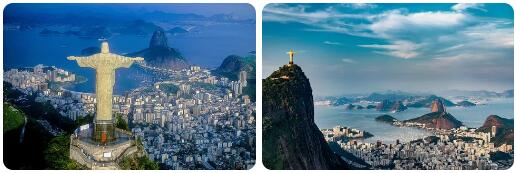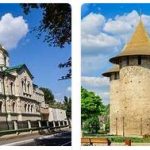Brazil: travel info
How do you get to Brazil?
Of course, the best way to get to Brazil is by plane. The major international airports are served by numerous countries directly or non-stop. But many cruise ships also call at Rio de Janeiro, for example.
Travel in the country
Flights
Brazil has four major airlines: Varig, TAM, VASP and Trans Brasil flying to nearly every Brazilian airport. For the smaller airports there are sometimes scheduled flights from the Varig subsidiaries Nordeste and Rio Sul. For smaller and more unusual routes, especially in the Amazon region, there are also air taxis, i.e. privately operated smaller aircraft.
A number of “low-cost airlines” have also established themselves in recent years. These fly under the same conditions as Ryanair and Easyjet, but can usually not yet be booked online. The best known low-cost airlines are BRAM and GOL, which fly to most of the major cities in Brazil. In the high season it is important for all airlines to book well in advance, as the flights are booked out quickly and become very expensive.
If a longer and more extensive trip to Brazil is planned, it is a good idea to get an Air Pass from one of the larger Brazilian airlines while in Europe. With an Airpass you can choose different stops on a round trip and then arrive back at the place of origin of the overseas flight. This saves a lot of time and money and is highly recommended.
Ferry
connections Ferry connections in Brazil are usually good and mostly essential. Especially in the Amazon region and for certain regions of the Pantanal, travelers are almost completely dependent on ferry traffic. In these regions you can spend days or weeks on the river arteries, which is the only way to cross large parts of these regions. A large number of the Atlantic islands can only be reached by ferry.
Railways
There are hardly any passenger rail connections through Brazil. There are still over 30,000 km of railroad tracks, but these are mainly used for freight traffic. A few steam locomotives are still used as tourist attractions such as the 13 km long route from Sao Joao del Rei to Tiradentes in Minas Gerais. There is an electric rail link between Curitiba and Paranagua in Paraná state. Every morning a tourist train travels through the steep mountain ranges of the Mata Atlantica and provides exciting insights into the flora and fauna of the region.
Bus Bus
tours are the most common way of traveling in Brazil for the majority of Brazilians and many tourists. The very well developed network of bus routes and city connections throughout the country (with the exception of the Amazon basin) makes up for the lack of a railway infrastructure. Direct connections between major cities leave several times a day from the respective bus stations (“Rodoviárias”), and between the cities of São Paulo and Rio de Janeiro even every 15 minutes at rush hour. The buses are usually punctual, clean and reliable and offer a very good price ratio.
There are three different classes: convencional (a completely normal coach), executivo (air-conditioned with seats and pillows that can be adjusted very far back), leito (the most comfortable variant: wide, fully adjustable seats, air conditioning, blankets and pillows). The Leito and Executivo classes also have chilled water, coffee and small snacks.
There is a website where you can find out about travel times and connections (see WebLinks), but you cannot make online bookings there. You have to buy tickets either directly at the counter or from selected travel agencies or have them brought to you by a messenger, which is highly recommended during the high season in summer or for long-distance journeys.
Roads
Using cars on the road network in Brazil is often the only way to get to more remote areas. It’s also the most flexible way to get around the country. However, caution should be exercised, especially in the big cities, as Brazilians generally have a very reckless and dangerous driving style. In addition, raids can be expected at red lights in a number of large cities, such as Sao Paulo.
According to an estimate from 2005, there are around 2 million km of roads in Brazil, of which only around 185,000 km are paved.
Rental
Cars Getting around in a rental car is an easy and safe way to keep your travel arrangements flexible. The conditions are the same as in Europe, but you should pay particular attention to contract clauses that deal with accident insurance and theft.
International license plate
The international license plate of Brazil is:
| BR |
Brazil: entry and exit regulations
Formalities, visas
For stays of up to 90 days, tourists with an Austrian, Swiss or German passport, which must be valid for at least six months upon arrival, can enter the country without having to obtain a visa.
A child ID is recognized, but it is recommended that you have a photo attached to it. The entry of a child in the mother’s passport is recognized; local problems can arise if the child is entered in the father’s passport.
Entry cards and stamps are issued at the airport. The immigration card should be kept separate from the passport so that legal entry can be proven even if the passport is lost. Before the 90-day period has expired, an application for an extension of the residence permit for a maximum of another 90 days can be requested from a federal police station (Polícia Federal – Departamento da Polícia Marítima, Aérea e de Fronteiras = DPMAF). The permitted total length of stay within 12 months is a maximum of 180 days.
If you are staying for a longer period of time, you must apply for a visa beforehand at the embassy (consulate) responsible for your place of residence, as otherwise difficulties may arise when leaving the country.
Visas and passports
Brazil has a policy of reciprocity: Citizens of a country in which Brazilians require a visa must apply for a Brazilian visa in their country before leaving. Citizens of the USA and France are among them. Citizens of the Federal Republic of Germany, Switzerland and Austria do not need a visa if they enter as tourists, as already mentioned.
National currency
The national currency of Brazil is the real = 100 centavos.
The following banknotes are valid and in circulation in the country:
- 1
- 5
- 10
- 20th
- 100 REAL
Import and export of foreign currency
Cashless money transactions in Brazil are the easiest way to deal with foreign currency. You can pay with credit cards almost everywhere (preferably Mastercard and Visa) and most national banks have international ATMs from which you can also withdraw money with an EC card. There are also ATMs of the Banco 24hrs at many petrol stations and bus stations, which also accept international credit types.
Import and export of goods
Customs regulations
A form for the customs declaration is given on the plane. As in most other countries, food of animal origin, plants, fruits and seeds are confiscated. Gifts cannot exceed US $ 100 in value. The following are also duty-free: 25 cigars, 400 cigarettes, 280 g of perfume and 2 liters of alcoholic beverages.
Brazil has very strict rules for importing computers. Upon entry, all devices must be registered that must be presented again upon departure. Electronic devices whose value does not exceed US $ 300 can enter the country on a tourist visa without registration and may be left behind as gifts.
Brazil: Travel Medicine, Vaccinations and Warning Labels
As far as the larger cities are concerned, medical care in Brazil can be compared with that in Europe. In the countryside, however, it is often problematic in terms of technology, equipment and/or hygiene. Worldwide health insurance coverage and reliable travel repatriation insurance are urgently recommended, as the costs for medical treatment and hospital stays are sometimes considerably higher than in Germany. They are often not or only partially covered by German health insurances.
Infectious diseases
In Brazil, the following infectious diseases, which are not or less common in Germany or Central and Northern Europe, are to be expected:
- Malaria , no risk of malaria, exists on the east coast including the Iguacu Falls. With the exception of the cities in the Amazon basin, there is also no risk of malaria in the cities. About 75% of the infections occur with the very dangerous malaria tropica, the rest with malaria tertiana.
- AIDS
- Schistosomiasis , but only sporadic, such as in the Amazon basin
- Chagas disease , especially in rural areas
- cholera
- Dengue fever, dengue fever is now a major health problem in parts of the country. At the beginning of March 2008, around 33,000 people in and around Rio de Janeiro were infected, around 70 of whom died.
- Intestinal infections, contaminated food or water, including amoeba, lamblia, salmonella, shigella, worm infestation and all kinds of viruses and bacteria
- Filariasis
- Typhus especially in the northeast of the country
- Yellow fever
- Kala-Azar
- Leishmaniasis
- Polio, polio
- Meningococcal meningitis, the main risk of infection is in the slums
- Plague, isolated occurrence
- sunburn
- tetanus
- rabies
- typhus
Vaccination recommendations
When traveling to Brazil, the following vaccinations recommended:
- Diphtheria, this vaccination should always be carried out at home
- Hepatitis A and B, this vaccination should always be carried out at home
- Yellow fever, s. Compulsory vaccination
- Polio, polio, this vaccination should always be carried out, including at home
- Meningococcal meningitis
- Tetanus, this vaccination should always be carried out at home
- Rabies, only recommended if contact with strange animals is likely
- Typhoid, only recommended if contact with contaminated water or contaminated food is likely
Compulsory vaccination
For all persons who come from a yellow fever infection area designated by the WHO, there is a compulsory vaccination against yellow fever.
Yellow fever vaccination for children
In most of the countries where yellow fever vaccination is mandatory, this also applies to children over 1 year of age, in some countries even from 6 months. It should be noted that
vaccination against yellow fever had a number of side effects, such as encephalitis. Around two thirds of those affected were children under 6 months. Therefore, under no circumstances should children under this age be vaccinated. But children under one year of age should also not be vaccinated if possible. If in doubt, yellow fever infection areas must then be avoided.
Any vaccination against yellow fever may only be carried out in specially authorized yellow fever vaccination centers!
Malaria prophylaxis
When traveling in the country it is advisable to undergo malaria prophylaxis. If the side effects seem questionable to you, you should at least have a “stand-by product” with you.
General health
prophylaxis By eating and drinking hygienically (only boiled food, nothing warmly warmed up), most diarrhea, some of which is dangerous, can be avoided; Consistent mosquito protection prevents many tropical and other infectious diseases
Drinking water Tap water should never be drunk
in Brazil. Although the water in the cities is sometimes heavily chlorinated, Brazilians also filter their water.
Sun protection
The tropical sun should by no means be underestimated. At the sea there is usually a pleasant breeze, so that on the beach it is often too late to notice how much you have been exposed to the sun. It is best to avoid exposure to the sun completely, which is especially true for children. Sun creams with a high protection factor should always be used.
Current warnings
Foreign Office of the Federal Republic of Germany
Citizen Service
Tel.: 0049 – (0) 30 – 5000 – 2000
www.auswaertiges-amt.de/de
Embassies and consulates
Representations of Brazil in Germany
The embassy of the ” Federative Republic of Brazil ” in Berlin is located on Wallstrasse on the Spree near the Fischerinsel in Berlin-Mitte and is directly opposite the Märkisches Museum.
The modern embassy building was occupied in July 2000 and officially opened on October 5, 2000 on the occasion of the state visit of Brazilian President Cardoso. The Jannowitzbrücke S and U-Bahn (city rail) station is a few 100 meters away. The U8 underground line, which runs between the Wittenau and Hermannstrasse stations, runs here.
Embassy of Brazil
Wallstrasse 57
10179 Berlin
Tel: 0049 – (0) 30 – 72 62 80
Consulate General in Frankfurt/Main
Hansaallee 32
60322
Frankfurt am Main
Tel: 0049 – (0) 69 – 92 07 42 0
Consulate General in Munich
Sonnenstrasse 31
80331 Munich
Tel: 0049 – (0) 89 – 2 10 37 60
E-Mail: 101 465.3454@compuserve.com
Web: www.consbras-munique.de
Honorary consulates can be found in Aachen, Bremen, Hamburg, Hanover and Stein.
German representations in Brazil
Embassy of the Federal Republic of Germany in Brasilia
Avenida das Nações, Lote 25, Quadra 807
70415-900 Brasilia DF
Tel: 0055 – (0) 61 – 344 270 00
Email: info@brasilia.diplo.de
Web: http: //www.brasilien.diplo.de
Consulado Geral da República Federal da Alemanha
Rua Presidente Carlos de Campos 417
22231-080 Rio de Janeiro RJ
Tel: 0055 – (0) 21 – 25 54 00 04
Email: info@rio.diplo.de
Web: http: // www. brasilien.diplo.de
Consulado Geral da República Federal da Alemanha
Edf. Empresarial Center III
Rua Antonia Lumack do Monte, 128, 16 ° andar, Boa Viagem
51.020-350 Recife PE
Tel: 0055 – (0) 81- 34 63 53 50
Email: info@recife.diplo.de
Web: http: // www.brasilien.diplo.de
Consulado Geral da República Federal da Alemanha
Rua Prof. Annes Dias 112, 11 ° andar
90020-090 Porto Alegre RS
Tel: 0055 – (0) 51 – 32 24 95 92/55
Email: info@porto-alegre.diplo.de
Web: http://www.brasilien.diplo.de
Consulado Geral da Republica Federal da Alemanha
Avenida Brigadeiro Faria Lima, 2092-12 ° andar, Jardim Paulistano
01451-905 Sao Paolo SP
Tel: 0055 – (0) 11 – 30 97 66 44
Email: info@sao-paulo.diplo.de
Web: http://www.brasilien.diplo.de
Another consulate general can be found in Recife, other honorary consulates in Belo Horizonte, Belém, Blumenau, Cuiabá, Curitiba, Fortaleza, Jóinville, Manaus, Ribeirão, Rolândia, Salvador, Santos and in Vitória.
Austrian representations in Brazil
Embassy of the Federal Republic of Austria in Brasilia
SES (Setor de Embaixadas Sul), Av. das Nacoes, Quadra 811 –
Lot 40 70426-900 Brasilia DF
Tel: 0055 – (0) 61 – 344 334 21/331 11/332 31/333 73
Email: brasilia-ob@bmeia.gv.at
Web: www.aussenministerium.at/brasilia
Consulate General in Sao Paulo
Rua Dr. Cardoso de Melo 1340, 7. andar – conj. 71 – Vila Olimpia
04548-004 Sao Paulo SP
Tel: 0055 – (0) 11 – 30 44 99 44
You can find other honorary consulates in Belo Horizonte, Curitiba, Fortaleza, Manaus, Porto Alegre, Recife, Salvador, Treze Tilias and in Vitória.
Representations of Brazil in Austria
Embassy of the Federal Republic of Brazil in Vienna
Pestalozzigasse 4/2
1010 Vienna
Tel: 0043 – (0) 1 – 512 06 31
Email: mail@brasilemb.at
Honorary Consulate of the Federal Republic of Brazil in Linz
Hessenplatz 19
4020 Linz
Tel: 0043 – (0) 732 – 77 65 43 – 24
Email: beinkofer@trading.co.at
Honorary Consulate of the Federal Republic of Brazil in Innsbruck
c/o Volksbank Tirol, Meinhardstrasse 1-3
6020 Innsbruck
Tel: 0043 – (0) 512 – 530 30
Honorary Consulate of the Federal Republic of Brazil in Graz
Glacisstraße 67/1
8010 Graz
Tel: 0043 – (0) 316 – 821 165
Email: office@griss.at
Honorary Consulate of the Federal Republic of Brazil in Hard
Wallstrasse 9
6971 Hard
Tel: 0043 – (0) 5574 – 90 800
Email: vorarlberg@brasil.or.at
Honorary Consulate of the Federal Republic of Brazil in Salzburg
Sterneckstrasse 52
5020 Salzburg
Tel: 0043 – (0) 662 – 65 965 – 300
Email: erich.hackl@geoconsult.at
Swiss representations in Brazil
Embassy of Switzerland in Brasilia
SES, Avenida das Nações
Qd. 811,
Lot 41 70448-900 Brasilia/DF
Tel: 0055 – (0) 61 – 34 43 55 00
0055 – (0) 61 – 34 43 39
22/34/Email: bra.vertretung@eda.admin.ch
Web: www.eda.admin.ch/brasilia
Consulate General in Rio de Janeiro
Rua Cândido Mendes 157
11 ° andar
20241-220 Rio de Janeiro/RJ
Tel: 0055 – (0) 21 – 22 21 18 67
Email: rio.vertretung@eda.admin.ch
Web: www.eda. admin.ch/riodejaneiro
Consulate General in Sao Paulo
Rua Cândido Mendes 157
11 ° andar
20241-220 Rio de Janeiro/RJ
Tel: 0055 – (0) 21 – 22 21 18 67
Email: rio.vertretung@eda.admin.ch
Web: www.eda.admin.ch/riodejaneiro
You can find other honorary consulates in Belo Horizonte, Curitiba, Fortaleza, Joinville, Manaus, Porto Alegre, Recife and Salvador.
Representations of Brazil in Austria
Embassy of the Federal Republic of Brazil in Bern
Monbijoustrasse 68
Case postale 1004,
3000 Bern 23
Tel: 0041 – (0) 31 – 371 85 15
Brazilian Consulate in Zurich
Stampfenbachstrasse 138
8006 Zurich
Tel: 0041 – (0) 44 – 206 90 20/30








